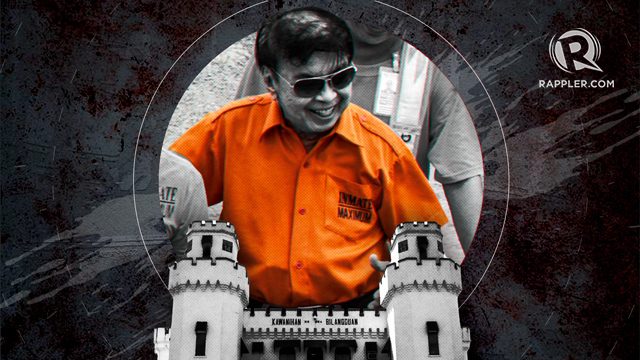SUMMARY
This is AI generated summarization, which may have errors. For context, always refer to the full article.

MANILA, Philippines – The story began Tuesday night, August 20, when reporters received unverified information that convicted rapist and murderer Antonio Sanchez, imprisoned in Bilibid for 25 years, might be walking free soon.
Reporters asked Justice Secretary Guevarra for confirmation. In one text message, Guevarra said Sanchez “may actually be released,” and in another he said the convict “is very likely for release.”
Reporters then had a telephone conference with the justice secretary, who explained that a July 2019 Supreme Court ruling made the 2013 Good Conduct Time Allowance (GCTA) law retroactive, and would therefore apply to inmates like Sanchez.
The GCTA law can slash by up to 19 years the sentence of an inmate jailed in the 1990s if he had behaved well throughout his term. For every month of sustained good behavior, an inmate earns points, whose total, by the time of the effectivity of the law, will be used to determine the number of days by which his sentence will be reduced.
Guevarra reiterated: “That benefits lahat ng mga nakakulong na preso ngayon kaya isa sa mga magbe-benefit doon ay si Mayor Sanchez..pati siya mae-entitle duon sa computation ng Good Conduct Time Allowance (GCTA).”
(That benefits all the inmates, so one of the beneficiaries will be Mayor Sanchez. Even he will be entitled to the computation of the Good Conduct Time Allowance.)
Public backlash ensued after story was reported. .
The backtrack
On Thursday, August 22, Bureau of Corrections (BuCor) Director General Nicanor Faeldon said that while Sanchez is eligible to avail himself of the GCTA, he might still have to stay in Bilibid for several years because of misdemeanors he reportedly committed, like stashing drugs in his jail cell and smuggling in luxuries like kubol, television, and airconditioning unit.
“Preliminary, kasi marami siyang involvement sa some not good behavior eh baka hindi nga siya qualified, that’s really the probability. He may not be qualified to go home today or in the next few months, mukhang hindi sya mapapasok kaagad. Baka abutin pa siya ng several years,” Faeldon said.
(Preliminary, because he is involved in some not good behavior, maybe he is not qualified, that’s really the probability. He may not be qualified to go home today or the next few months, he may not get releases immediately. Maybe it will take him several years.)
This was around noon of Thursday. By this time, reporters had also pointed out to Guevarra that aside from the Eileen Sarmenta-Allan Gomez case, Sanchez was also convicted for the double murder of Nelson and Rickson Peñalosa.
Guevarra had this to say at the time: Sanchez can still get early release “only if he has earned enough good conduct credits during imprisonment.”
At this point, the messaging had become: while Sanchez is eligible to avail himself of good conduct time allowance, he may not have that many credits yet for early release.
Not qualified at all
Late afternoon Thursday, Guevarra called for a press conference at the Department of Justice, where he was asked: does the law disqualify people convicted of heinous crimes from availing themselves of the benefits of good conduct time allowance?
“If a person [is] charged with a heinous crime, [he is] not qualified at all” had become Guevarra’s stand.
By Friday, August 23, Guevarra had an explanation: the wording of Section 1 and Section 3 of the law means that only inmates eligible for credit of preventive imprisonment (CPI) are also eligible for GCTA. Because people charged of heinous crimes are not eligible for CPI, then they are also not eligible for GCTA. (Read more on that here.)
Over at Malacañang, Presidential Spokesperson Salvador Panelo would echo Guevarra.
“This is the letter and the spirit of the law. Thus, the inevitable conclusion is that all those convicted of a heinous crime, including Mr Antonio Sanchez, would be ineligible and disqualified from availing the benefits of the GCTA,” said Panelo.
Amid the backtracking, Guevarra said: “It’s been a tough process of interpreting the wordings of a law that has certain ambiguities in its provisions. In the end, however, it is the spirit and the intention of the law that guided us in taking a position.”
Despite a categorical statement from both Guevarra and Malacañang that the likes of Sanchez are not eligible for reduced sentenced under the GCTA law, the final answer lies with the law.
Guevarra acknowledges this.
“Clarity could be obtained through an amendment of the subject law or an interpretation by the Supreme Court in a proper case. If there is doubt, either the Supreme Court interprets or Congress amends,” the justice secretary said. – Rappler.com
Add a comment
How does this make you feel?
There are no comments yet. Add your comment to start the conversation.